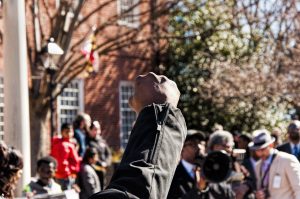While it is questionable whether the Chinese government genuinely cares about universal human rights and racial equality, its propaganda apparatus has seemingly become an active “supporter” of the global Black Lives Matter (BLM) movement – mostly in the form of lambasting the U.S. government and system. As Foreign Ministry spokesperson Zhao Lijian remarked, “Racism against ethnic minorities in the U.S. is a chronic disease of American society.” In a tweet, another Chinese Foreign Ministry spokesperson, Hua Chunying, replied “I can’t breathe,” which has become a rallying cry for BLM, to U.S. State Department Spokesperson Morgan Ortagus’ criticism of Beijing’s Hong Kong policies.
By invoking BLM, Beijing’s recent propaganda campaign hopes to send two messages. First, the United States’ hypocrisy in criticizing China’s human rights conditions. Aiming at both domestic and international audiences, state media such as Xinhua and People’s Daily accused the United States of not facing up to its own issues: “While criticizing China for ending chaos, some U.S. politicians label themselves as beacons of democracy and human rights. Such double standards reveal their hypocrisy driven by ulterior political motives.” Second, Beijing emphasizes the failure of the liberal democratic system as represented by the United States, through which the Chinese political system is portrayed in a more positive light. As remarked by China expert Susan Shirk, the protests will cause fewer Chinese to “voice support for American ideals, such as free markets and civil liberties.”
The BLM movement, along with the outbreak of COVID-19 in the United States, offered Beijing a long-needed breakthrough in its failing narrative warfare with Washington. Global criticism over the human rights situation in Xinjiang and Hong Kong has escalated since last year and China’s political system was blamed for the inability to prevent and contain the initial outbreak of the pandemic. China’s nationalist sentiments also played a role in the recent counter-narrative. Global Times editor, Hu Xijin, commented that the attack on the United States reflects “a kind of vengeful feeling, which I think is human nature.”
However, Beijing is crossing a thin line by building narratives on an issue it is inexperienced in dealing with, especially when international propaganda hasn’t been its strong suit in general. In one tweet, Hua Chunying, likely by mistake, wrote “all lives matter” — a slogan commonly used to undermine the BLM movement. Previous unawareness of racial sensitivities has generated backlash for China in cases such as CCTV’s 2018 New Year’s Gala show in 2018, which praised China’s building of railways in Africa in a skit featuring actresses wearing blackface and holding fruit baskets.
More importantly, China’s vocal criticism of minority rights violations in the United States increases the attention drawn to its own ethnic issues and poses the risk of being targeted by the BLM for its own racial discrimination against Blacks. While the People’s Republic of China can rightly say it has never enslaved Black people (although Black slavery was recorded in Imperial China), yet considerable cases of xenophobia directed at people of African descent provide fertile ground for accusations of China being a racist country.
In 1988, thousands of Chinese chanted racist slogans after two African students at Hehai University brought Chinese girls into their dorms. As recently as 2017, Pan Qinglin of China’s Political Consultative Conference urged the government to “strictly control the African people living in Guangdong and other places,” arguing that “Africans bring many security risks.” Discrimination against Black people in China more commonly made global news headlines as the pandemic has pushed fear and xenophobia to a new height, with many criticisms of “forceful testing, quarantine and other inhuman treatments meted out to Africans.” China’s Foreign Ministry stated that it has “zero tolerance for discrimination,” and China’s state media Xinhua has called accusations of coronavirus-related discrimination against Africans “groundless rumors.” Yet a number of African nations have summoned their Chinese ambassadors to address the issue of discrimination in China, which the African Union has stated caused “grief, pain and humiliation to all Africans.” The U.S. consulate, ironically, warned about the discrimination against African-Americans in Guangzhou on its website.
There is an additional risk for China to propagandize on BLM given Hong Kong’s pro-democracy protesters’ calls for greater support of the BLM movement in Hong Kong. The movement has a strong focus on police accountability, and thus may delegitimize Hong Kong’s police tactics during the protests. While the BLM movement’s aims differ from those of the Hong Kong protests, both movements draw support from values of human rights and fundamental freedoms. Beijing’s support for BLM may obfuscate its position on quelling civil disobedience and arguably impede its efforts in preventing a possible convergence of human rights movements.
The Chinese Constitution stipulates that “discrimination and oppression of any ethnic group is prohibited. It is forbidden to undermine ethnic unity and create ethnic divisions.” Yet China’s enforcement of racial and ethnic equality has been lacking, which has damaged its global image and capacity to form convincing propagandist narratives against the United States. As its society continues to reveal racial discrimination and as racial tensions rise alongside its growing investment in Africa, China may risk becoming a target of another BLM. A Chinese boss shot and injured two Zimbabwean employees on June 21. As the death of George Floyd has rippled from the United States to the world, it wouldn’t be unimaginable if the same anger would fall on China over racial issues in the future.

































